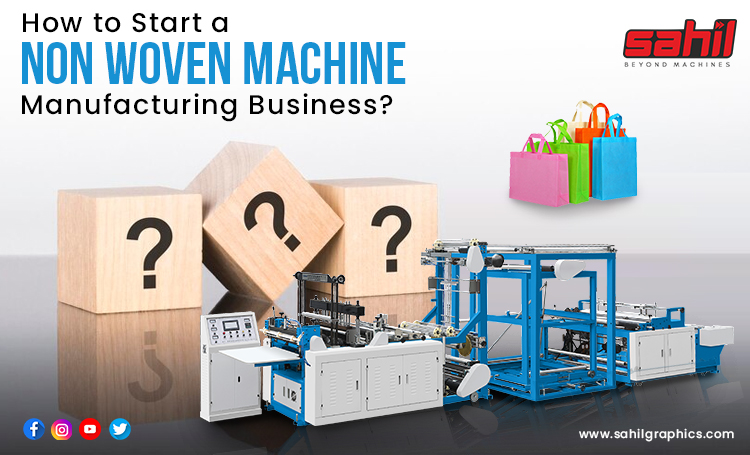April 5th, 2024 Sahil Graphics

Polypropylene-based non-woven bags are well-known for their durability, strength, and environmental friendliness, making them an excellent choice for transporting groceries and other items. With a high global demand for such products, establishing a manufacturing company specializing in non-woven bag-making machinery can be a profitable business venture.
When done correctly, a startup focused on manufacturing these machines has the potential to grow into a strong and profitable business. The growing global emphasis on sustainable practices makes such an attempt much more viable. By tapping into the rising demand for eco-friendly solutions, a well-managed non woven bag machine manufacturing may establish itself as a successful and sustainable firm.
The primary machinery required for manufacturing non-woven bag-making machines is:
The manufacturing unit also needs additional auxiliary machines like a conveyor system, packing equipment, testing rigs, etc. High-quality Chinese imported machines can be acquired at reasonable prices for the startup equipment.
Polypropylene granules are the critical raw ingredient for producing non-woven fabric in various grades. Non-woven fabric rolls in the 75-150 GSM range would be ideal for shopping bag production. Such fabric can be procured from leading textile hubs in India like Surat or imported from China and Taiwan. Other regular raw materials consist of bag handles, threads, labels, etc., which are easily obtainable.
The step-by-step manufacturing process is as follows:
Quality control checks should be performed during each phase to ensure the production of defect-free bag-making machines. The entire process, when systemized, can be managed by 2-3 skilled technicians.
A small factory space spanning 2500-3000 sq. ft should initially accommodate the machinery and raw material inventory needed. The unit premises should include separate marking and dispatch bays. Additionally, a small office space for administrative work will also be required. They are locating the startup facility near an industrial area and availing ample electricity supply and water connection necessary utilities.
To operate this manufacturing business, the following staff will be required:
Based on order inflows, the unit can begin with 3-4 personnel and add more later. Personnel with expertise in plastics processing machinery would prove beneficial.
The key compliances needed for commencing operations are:
Additionally, the premises should be legally registered as a commercial establishment for adherence to safety regulations.
The following sales strategies may be deployed for healthy marketing:
Implementing such techniques can fetch better client response and sales conversions.
An estimated capital investment of ₹20-25 lakh would be required for kickstarting operations such as:
Working capital requirements during the initial months can be self-funded or financed via small business loans. As revenues build, the entrepreneur can target breaking even within the first operational year.
The growing usage of eco-friendly, non-woven fabric bags has opened up a profitable niche for automated bag-making manufacturers. Small players can succeed in this segment by procuring the right equipment and adopting intelligent marketing techniques. A well-run Non Woven Bag Making Machine unit thus holds the potential to achieve a healthy turnover and steady expansion year on year.
Ask Our Experts